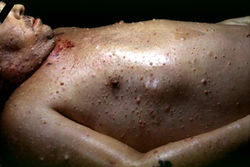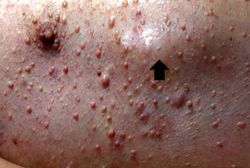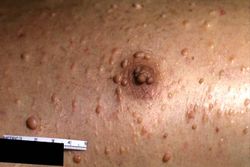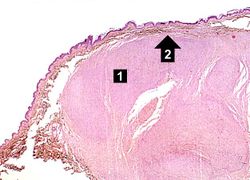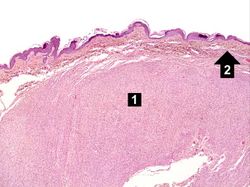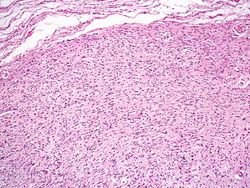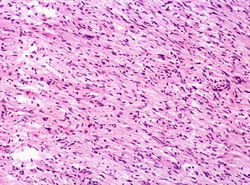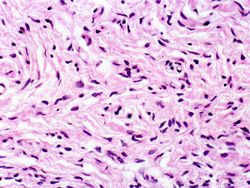IPLab:Lab 5:Neurofibromatosis
Contents
Clinical Summary[edit]
This 45-year-old divorced white male came to the emergency room with severe hepatic cirrhosis and aspiration pneumonia. Shortly after admission he developed cardiac arrhythmias and died. Significant past history included alcohol abuse, cirrhosis, and neurofibromatosis. He had no family history of neurofibromatosis, but his condition was diagnosed at age 17 when he developed neurofibromas along the lateral chest wall. There was no history of continued follow-up after this initial diagnosis.
Autopsy Findings[edit]
The patient was covered with variably sized subcutaneous nodules ranging from 0.5 to 2.5 cm in diameter. Other significant findings included micronodular hepatic cirrhosis (liver weight: 1760 grams), ascites (500 ml), and splenomegaly (weight: 260 grams).
Images[edit]
Virtual Microscopy[edit]
Study Questions[edit]
Additional Resources[edit]
Reference[edit]
- eMedicine Medical Library: Type 1 Neurofibromatosis
- eMedicine Medical Library: Dermatologic Manifestations of Neurofibromatosis Type 1
- Merck Manual: Neurofibromatosis
- Neurofibromatosis: MedlinePlus
Journal Articles[edit]
- Kiliç S, Tezcan I, Sanal O, Ersoy F. Common variable immunodeficiency in a patient with neurofibromatosis. Pediatr Int 2001 Dec;43(6):691-3.
Images[edit]
| |||||
Cirrhosis is a liver disease characterized by necrosis, fibrosis, loss of normal liver architecture, and hyperplastic nodules.
In alcoholics, aspiration pneumonia is common--bacteria enter the lung via aspiration of gastric contents.
Arrhythmias are abnormal heart rhythms.
A normal liver weighs 1650 grams (range: 1500 to 1800 grams).
Ascities is the accumulation of fluid with in the abdominal cavity. There should be less than 30 ml of fluid in the peritoneal cavity.
260 grams)
Splenomegaly means enlargement of the spleen. The normal spleen weighs 155 grams.
